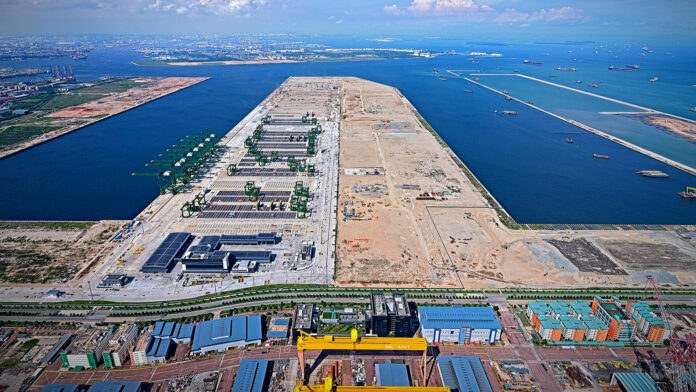Singtel has drafted-in Ericsson to deploy a dedicated 5G network on a slice of its public 5G network at Tuas Port in Singapore, the new greenfield ‘mega port’ development that will eventually engulf and replace existing shipping terminals at the Port of Singapore. It will also deploy private 5G networks for critical-grade port operations. The new 5G provision will support full automation, starting with automated guided vehicles (AGVs) from 2025, and put the facility on the way to handling 65 million twenty-foot equivalent units (TEUs) per year when it is fully completed.
Current demand for transhipment services stands at half that, said a press note. Tuas Port is covered with triple-band 5G, in 3.5GHz, 2.1GHz, and (newly-available) low-band 700MHz spectrum. From 2025, 5G-connected AGVs at the site will be capable of “independently transporting containers, thereby optimising yard operations and reducing labour costs”. Remote-controlled cranes will move “massive cargo with precision from a safe distance”. By the 2040s, the site will have “over” 1,000 battery-powered driverless vehicles and “almost” 1,000 automated yard cranes
Before then, from 2025, PSA International, formerly the Port of SIngapore Authority, will use 5G to connect and process “real-time” shipment tracking data so berth planners can optimise scheduling and traffic flow. It will also (“over the next three years”) deploy 5G-based drone-based surveillance and extended reality applications for predictive maintenance – to “detect potential issues early and pre-empt equipment failure, thereby improving efficiency and reducing costly downtime”.
A statement said: “Existing automated vehicles deployed at the port… will be upgraded to 5G to enhance real-time shipment tracking and streamline crane operations to enable seamless transportation of cargo from berth to ships and vice versa… Singtel will activate a slice from its 5G network to provide the dedicated [network] resources… for mission-critical applications to run smoothly around the clock. It will also create secure private networks tailored to the port’s specific security needs, to help mitigate the risk of data breaches and unauthorised access.”
PSA International has terminals in 26 countries, and flagship operations in Singapore and Antwerp. Global container throughput will reach 906 million TEUs by the end of 2024, it reckons; the firm has handled 34.1 million TEUs in Singapore so far this year. Tuas Port, which started operations in late 2021 (and officially opened in late 2022), is its flagship smart-port development; it will be the “world’s largest fully automated port” by the 2040s, it reckons. The site was running three deep-water berths, as of last year, and has future capacity for 26 kilometres of berths.
Its existing city terminals, where Singapore has traded since 1819, are to close in 2027; the Pasir Panjang Automobile Terminal, in Queenstown, is to close by 2040. By 2025, the Maritime and Port Authority (MPA) of Singapore wants $4.5 billion in new “value-add” and 5,000 new jobs. Singtel has been involved in 5G-based Industry 4.0 trials at Sentosa, off Singapore’s south coast. The Singapore slicing project is the second in recent months, following news in July that APM Terminals has tapped Hrvatski Telekom for a slice of its 5G network at the new Port of Rijeka, in Croatia.
Nelson Quek, regional chief executive in Southeast Asia for PSA International, said: “ PSA continuously seeks and embraces cutting-edge technologies to advance our port operations. We are pleased to be working with Singtel and Ericsson to deploy a 5G network at Tuas Port to support our growing fleet of AGVs… PSA aims to further streamline operations and optimise resource utilisation through real-time monitoring, enabling us to respond agilely to the evolving needs of our customers and stakeholders.”
Ng Tian Chong, chief executive at Singtel in Singapore, said: “5G’s high speeds and low latency help to improve real-time communication and data transfer which enables highly efficient port operations. With network slicing, these capabilities are augmented with increased security features and higher performance assurance. As a homegrown technology company, we are proud to help PSA International scale its operations, boost trade in the region, and further strengthen Singapore’s position as a leading port globally.”
Daniel Ode, head of Ericsson’s operations in Singapore, the Philippines, and Brunei, said: “5G has been enabling the digital transformation of various industries, from manufacturing, power and utilities, mining, to airports and seaports. The seaport sector, with its complex operations and reliance on real-time data, is benefiting significantly from 5G capabilities. At PSA International, automated vehicles moving cargo seamlessly across the port will enable PSA to scale its operations, eliminate human errors and increase efficiency.”

